
Marguerita Maria Christians, known as Mady Christians, was an Austrian-born German-American actress who had a successful acting career in theatre and film in the United States until she was blacklisted during the McCarthy period.
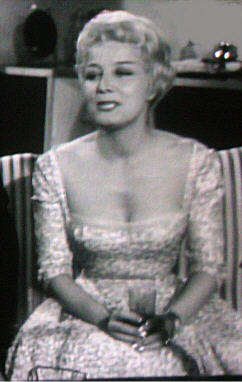
Mady Rahl was a German stage and film actress. Born Edith Gertrud Meta Raschke in Neukölln, now part of Berlin, Rahl trained as an actress and dancer. In 1935 she made her stage debut in Leipzig under the direction of Douglas Sirk and started her film career in 1936 with the movie The Mysterious Mister X. With her role in the circus drama Truxa (1937), Rahl became known to a wider audience. After the war, she sang with her friend Elfreide Datzig for the USO. She ultimately appeared in approximately 90 movies, several of them for UFA. In later years, she appeared frequently on television, while also pursuing her career in the theatre. She was also the German voice of many cartoon characters and of Lucille Ball.

The Runaway Princess is a 1929 British-German silent drama film directed by Anthony Asquith and Fritz Wendhausen and starring Mady Christians, Fred Rains, Paul Cavanagh, and Anne Grey.
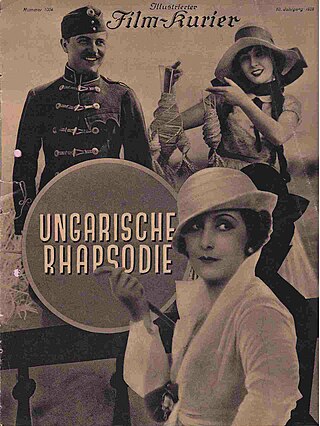
Hungarian Rhapsody is a 1928 German silent drama film directed by Hanns Schwarz and starring Lil Dagover, Willy Fritsch and Dita Parlo. It depicts the life of an impoverished Hungarian aristocrat.

The Farmer from Texas is a 1925 German silent comedy film directed by Joe May and starring Mady Christians, Willy Fritsch, and Lillian Hall-Davis. It was based on the play Kolportage by Georg Kaiser. The film was considered a costly box office failure, contributing to a financial crisis at Germany's largest studio Universum Film AG. The film's sets were designed by Paul Leni.

Madame de La Pommeraye's Intrigues is a 1922 German silent film directed by Fritz Wendhausen and starring Olga Gsowskaja, Margarete Schlegel and Grete Berger. The film was produced by Russo Film, a short-lived company backed by Decla-Bioscop which aimed to adapt literary works for the screen. The film was released shortly after Decla-Bioscop had been absorbed into the larger UFA group. It was based on a story by Denis Diderot. It premiered at the Tauentzienpalast on 20 January 1922.
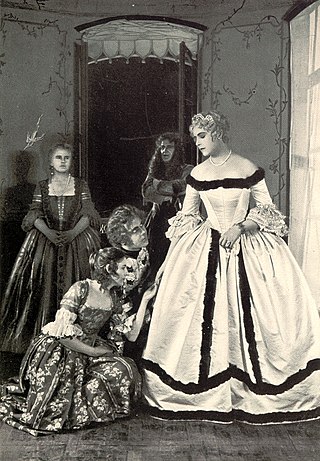
A Glass of Water is a 1923 German silent historical drama film directed by Ludwig Berger and starring Mady Christians, Lucie Höflich and Hans Brausewetter. It premiered at the UFA-Palast am Zoo on 1 February 1923. It was based on a play of the same title by Eugène Scribe, set in England during the reign of Queen Anne. The film was very well received both commercially and critically on its release. It is considered one of the milestones of Weimar cinema.

The Telephone Operator is a 1925 German silent comedy film directed by Hanns Schwarz and starring André Mattoni, Alexander Murski, and Willy Kaiser-Heyl. The film's art direction was by Erich Czerwonski. It was notable for the number of leading UFA technicians who worked on it. It premiered on 15 October 1925 at the Tauenzienpalast in Berlin. It is also known by the alternative title Liebe und Telefon.

A Waltz Dream is a 1925 German silent drama film directed by Ludwig Berger and starring Willy Fritsch, Mady Christians and Xenia Desni. It was based on the 1907 operetta Ein Walzertraum composed by Oscar Straus. It was influential on the development of later Viennese operetta films. Unlike many of UFA's ambitious productions of the 1920s, A Waltz Dream managed to recover its production cost in the domestic market alone.

Waltz of Love is a 1930 German musical film directed by Wilhelm Thiele and starring Lilian Harvey, Willy Fritsch and Georg Alexander. It was shot at the Babelsberg Studios in Berlin with sets designed by the art director Erich Kettelhut. It premiered at the Gloria-Palast in Berlin on 7 February 1930. A separate English language version The Love Waltz was also produced.
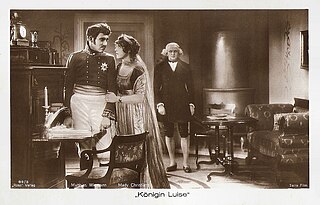
Queen Louise is a German silent historical film directed by Karl Grune and starring Mady Christians, Mathias Wieman, and Anita Dorris. It was released in two separate parts slightly less than a month from each other in December 1927 and January 1928. It commenced a series of historical epics directed by Grune. It was shot partly at the Terra Studios in Berlin. The film's sets were designed by the art director Hans Jacoby.

Comedy of the Heart is a 1924 German silent romance film directed by Rochus Gliese and starring Lil Dagover, Nigel Barrie and Alexander Murski. It premiered at the Tauentzienpalast in Berlin on 30 September 1924. It was based on a novella by Sophie Hoechstetter. The film was one of UFA's major releases of the 1923-1925 boom period. It was made at the Babelsberg Studio.
Latin Quarter is a 1929 German silent drama film directed by Augusto Genina and starring Gina Manès, Carmen Boni and Helga Thomas. It was based on a novel by Maurice Dekobra. It was shot at the Staaken Studios and on location in Paris. The film's art direction was by Franz Schroedter. It premiered at the Ufa-Palast am Zoo in Berlin.

Wenn die Musik nicht wär is a 1935 German drama film directed by Carmine Gallone and starring Paul Hörbiger, Willi Schaeffers and Ida Wüst. The film was shot at the Grunewald Studios in Berlin. It is based on the novel Der Kraft-Mayr by Ernst von Wolzogen. The film's art direction was by Fritz Maurischat and Karl Weber.
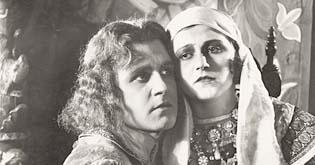
The False Dimitri is a 1922 German silent historical film directed by Hans Steinhoff and starring Alfred Abel, Agnes Straub and Eugen Klöpfer. Set in early seventeenth century Russia it portrays the rise of False Dmitriy I during the Time of Troubles.
Out of the Mist is a 1927 German silent drama film directed by Fritz Wendhausen and starring Mady Christians, Werner Fuetterer and Lia Eibenschütz. It was shot at the Staaken Studios in Berlin. The film's sets were designed by art directors, Erich Kettelhut and Karl Vollbrecht. It was released by the German subsidiary of the Fox Film Company.
Grand Hotel is a 1927 German silent drama film directed by Johannes Guter and starring Mady Christians, Dagny Servaes and Günther Hadank. It was shot at the Babelsberg Studios in Berlin. The film's sets were designed by the art director Erich Czerwonski.
National Film or National-Film was a German film production and distribution company which operated during the silent and early sound era. In the early 1920s it made an attempt to take over Erich Pommer's Decla-Bioscop, but the projected merger failed and Decla instead joined with the major studio UFA. While Decla was generally in favour of joining with National, it was pressured by its creditors Deutsche Bank to merge with UFA.
It Illuminates, My Dear is a 1922 German silent film directed by Paul L. Stein and starring Mady Christians, Hans Heinrich von Twardowski and Olga Belajeff.
Decla-Film was a German film production and distribution company of the silent era, founded by Erich Pommer and Fritz Holz in February 1915.












